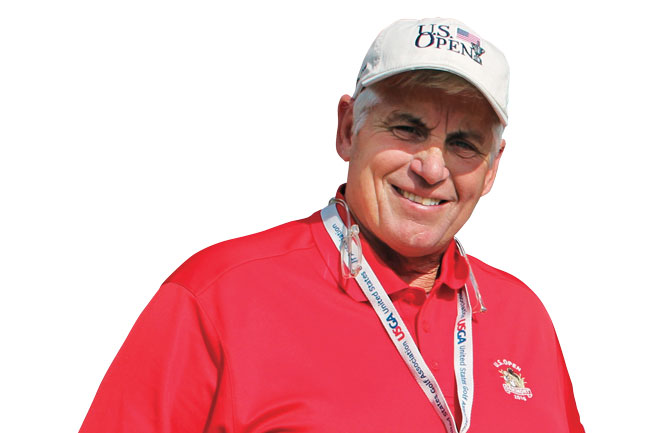Distance Education

illustration: Andrew DeGraff
I have been lucky to have some great mentors in my life… my father, the late Boyd Jones; a college professor who believed in me, Sharon Bass; our editor-at-large, Ed Hiscock, who took me under his wing during my time at GCSAA; and even my local bar owner, Rick Younger, who has treated me like a son for 20 years.
A Sports Illustrated story came out a year ago that inspired me. The story was “The Ultimate College Football Road Trip.” The premise was this: If you had unlimited funds, a nice RV and a entire fall season off work… where would you go for a once-in-a-lifetime road trip to see as many great games as possible? Where would you start, where would you finish?
I wanted to spin the idea for Golfdom. But instead of college football games, my thought was, “If you had unlimited funds, a nice RV and a entire fall season off work, which superintendents would you visit to sharpen your skills… and what would you learn?”
I wrote down the names of four superintendents I’ve come to know over the years whom I admire, and I reached out to their apprentices to glean some of what makes those superintendents special.
The stories I heard were both fun and inspirational. Arron McCurdy, whom I met when I worked the 2013 U.S. Open at Merion, spoke candidly with me about the importance of his mentor, Matt Shaffer.
“Mentors are extremely important, especially how I grew up,” McCurdy told me. “I was a product of the ’80s. Everyone I knew, their families were broken by divorce. Some were better than others… mine, not so much. I was a street kid, to be honest. Matt is a mentor to me but he’s also a father figure.”
I understood what McCurdy was talking about, and it made me even more excited for the story. So I got on the road to learn about some of the people who I consider to be the best in the business.
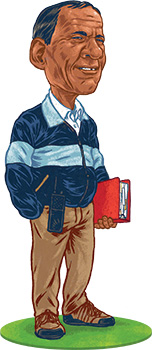
Dick Bator (illustration: Andrew DeGraff)
Dick Bator
I first met Mike McCormick at Oakmont during the 2016 U.S. Open. He was an assistant superintendent then working for John Zimmers (now at Inverness Club in Toledo) and current Oakmont superintendent David Delsandro. Mike now is superintendent at the Apawamis Club in Rye, N.Y.
McCormick is proud to consider himself the last of the true Bator disciples… he worked for the legendary superintendent (stints at Pine Valley, Merion, Oak Hill) at his final course, The International Club in Bolton, Mass., before Bator retired and became a consultant.
McCormick is happy to share stories of his time with Bator, who he says has had a monumental impact on his life and career.
“All due respect to the men and women who work in our armed forces, I believe working for (Bator) is the closest thing to going into the military you can find in our industry,” McCormick says. “The summer I interned for him I worked seven days a week, 90-hour work weeks, and I lost 30 pounds. On my last day, he told me I was his biggest disappointment he’d had in his 40 years as a superintendent.”
Wait, what?
“It was 100 percent to motivate me,” McCormick explains. “When I worked for him I was 19, and he lit a fire under my ass. He motivated me to be the best. He’s grateful for the guys who work their asses off, but he’s also hardest on those guys. When he called me a week later to check in on me and see how I was doing, it blew my mind — I didn’t think he cared. But then he went to work for me, setting me up with internships, calling me two or three times a week… he’s my original mentor.”
McCormick says high-pressure situations don’t bother him much after being in so many of those situations with Bator. If McCormick took one thing away from his experience with Bator, he says it’s his dedication to the industry.
“His sense of urgency, his attention to detail… he just attacks any agronomic program with 100 percent of what he has. I’ve never seen anything like it,” McCormick says. “He’s 74 now and he still consults, and he writes 100-page reports. I have a book in my office called ‘The Bator Bible.’ It’s all his notes from the ’80s and his time at Pine Valley, hosting the ’85 Walker Cup, to his time at Merion. Every spray program, notes on employees, grounds committee meetings… it’s a 400-page book!”
That’s just Volume 1. McCormick has multiple volumes on his bookshelf, which include magazine articles with Bator’s hand-scribbled notes alongside the stories.
“The other day he called me and said, ‘Mike, do you have my 17-point fairway texture maintenance program? I can’t find it.’ So I faxed it to him — he doesn’t have email,” McCormick laughs. “He’d make for a great reality show. He pushed all his guys to the breaking point… but if you made it? He returns it by being a thousand times more loyal to you.”
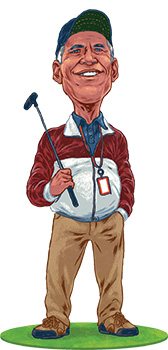
Matt Shaffer (illustration: Andrew DeGraff)
Matt Shaffer
McCormick could tell Bator stories all day, but I had to get moving to my next superintendent.
I knew Matt Shaffer prior to the 2013 U.S. Open at Merion, but it was leading into the tournament that I got to know him and his crew better.
To get some information on Shaffer, who is now enjoying semi-retirement, I contacted two guys who were working on the crew during the ’13 U.S. Open — Arron McCurdy, now superintendent at Metedeconk National GC, Jackson, N.J., and Pat Maher, now superintendent at Parkersburg CC, Vienna, W.Va.
“It was challenging working for him,” McCurdy told me, “and at the same time it was rewarding and fun. My time at Merion was more rewarding than any other time in my career. He would tell us, it’s not about you… (Merion) has history and you chose to work here. If you want to work at this level, this is what it entails.
“We worked a lot of hours… but the friendships I made there will last a lifetime,” McCurdy continues. “My friends from Merion are closer to me than my friends from high school or college.”
Maher echoes those comments, and says getting people to work together is Shaffer’s greatest talent.
“His ability to build his supporting cast is phenomenal,” Maher says. “He was able to find the right people who could spend ridiculous hours around each other. Every week we were all there, and every week he chose the right people to put on a job.”
Maher also says that despite the long hours, Shaffer ultimately put family first.
“During the week of the U.S. Open, my mom got real sick,” Maher recalls. “I didn’t tell Matt. This was the biggest tournament of our lives, I didn’t want to mess it up. He found out and he told me, ‘You need to leave. Our personal lives matter more than even the biggest tournaments.’” (Maher’s mom recovered.)
If McCurdy could absorb one attribute from Shaffer, it would be his ability to defuse situations with a sense of humor and brutal honesty.
“Prior to the U.S. Open, we were riding with the folks from John Deere, we were talking about their role in the tournament, the equipment we would be getting, etc.,” McCurdy recalls. “We came up on a member, and the member said something derogatory to Matt. Matt says, ‘You know what? I’m sure there is someone who would love to have your parking spot.’ Anyone else would have been escorted to the parking lot if they said that! But he instantly defused the situation.”
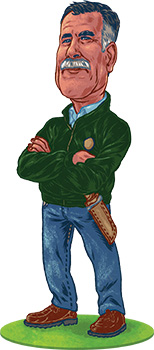
Bill Larson (illustration: Andrew DeGraff)
Bill Larson
Leaving behind the Merion guys, my journey took me to Minnesota to learn about Bill Larson, CGCS at Town & Country Club of St. Paul. I profiled Larson in the February 2015 issue — he was the winner of that year’s Herb Graffis Businessperson of the Year Award.
I talked to Aaron Johnson, CGCS at Dacotah Ridge GC in Morton, Minn., and Ryan Browning, superintendent at Valleywood GC in St. Paul, Minn. Both men were given good advice early in their careers: Go work for Larson if you want to succeed in the Minnesota golf market.
“Having a good mentor is extremely important,” Johnson says. “Even just getting that interview is so hard these days… Bill went above and beyond for all of his assistants.”
Browning firmly believes he wouldn’t be where he is today if he had not worked for Larson.
“You can learn anything you want to from a book at turf school. Being able to apply it is different,” Browning says. “The majority of my experience and knowledge comes directly from Bill.”
Both Johnson and Browning were given multiple opportunities to lead while they worked for Larson.
“When it came to managing the crew, he gave me free rein,” Johnson recalls. “We had to install a bunker, he gave me some direction and four different things he wanted me to be sure I accomplished… then he said, ‘Run with it.’ He was both hands-off and hands-on… it was a nice balance of allowing me to run without the risk of getting into too much trouble.”
Browning recalls Larson asking him a blunt question that marked a turning point in his career.
“We’d take these little field trips on Saturday mornings, following morning tasks,” Browning says. “He looked me in the eye and he asked me flat out, ‘Are you a leader?’ He told me that was the main quality he was looking for… he wanted to surround himself with good people and he wanted to know if I felt like I was up to the task. Apparently, I gave the right answer, because not much later I was promoted to first assistant.”
Johnson still leans on Larson today as a sounding board on topics from agronomic practices to personnel decisions. He says if he could reflect one attribute of Larson’s, it would be his salesmanship.
“Not just projects or purchasing equipment… but also the things we were doing on the golf course,” Johnson says. “Some areas of the course were really good, some areas needed some work, and he recognized that and talked to the membership about it. And if I could get one more, it would be his personality. He has a sense of humor, and it made it never feel like work — it was always fun and interesting working with Bill.”
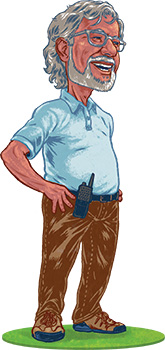
David Hay (illustration: Andrew DeGraff)
David Hay
Full disclosure: David Hay, longtime superintendent and currently CGCS at the 54-hole Mission Hills CC in Rancho Mirage, Calif., is a mentor of mine. He calls me “son” and celebrates my career achievements with me. No way was I leaving him out of this story. So that’s why I bothered John Leistiko in the middle of aerification.
Leistiko has been at Bear’s Best in Las Vegas since 2001, and he’s been the superintendent there since 2007. John started working on golf courses right out of high school. He moved up in the Las Vegas golf market the old fashioned way — hard work.
“David trusted me and he gave me my shot,” Leistiko says. “So if you see anything you don’t like out here, it’s his fault!”
Hay was a regional superintendent overseeing several courses in Las Vegas for ClubCorp when he first started advising Leistiko. The two remain close today.
“He’s obviously a great grass grower, but his skill is telling you to do something without making it sound like an order,” Leistiko says. “He’s a relaxed guy… in this business, many of us are high-tension people. He’s great at having a low-key approach.”
I asked Leistiko for a Hay story. This one came to mind:
“He sees things you don’t think he sees. One time we were driving the course and I drove by something I didn’t want him to see. He didn’t say anything. Two holes later he says to me, ‘How’s that project coming along on No. 9? You know, when you start a project, you also need to finish a project.’”
I asked Leistiko if he’s been able to adopt David’s low-key attitude. He says he’s working on it, but admits he’s not been successful.
“I’ve gotten a lot better, but I am high strung,” he says. “You want things to be perfect. In this environment — expectations high, budgets low — it’s tough. Labor is so difficult here… it took us six months to find two guys. We’ve been running on a skeleton crew for going on two years now.”
Leistiko says if he could mimic one skill of Hay’s, it would be the way he handles people and gets the best out of them. He stays positive, even in bad situations.
“Don’t get me wrong, I take my career seriously, but some guys act like they’re curing cancer,” Leistiko says as he laughs. “It’s growing grass! David has been around for 40 years. He can see what you’re doing, and he’ll help you do it better. If you have a tight budget, he’ll make it look good. If you have a big budget, he’ll make it look great.”
I could have talked to Leistiko all day, but the aerifer was calling him and I knew it was time to wrap up the road trip and file my story. I only made it as far west as Las Vegas. A valiant effort, but the project made me want more.
So I ask you: Who is your mentor? Who should I visit in 2019, and when are we going?










